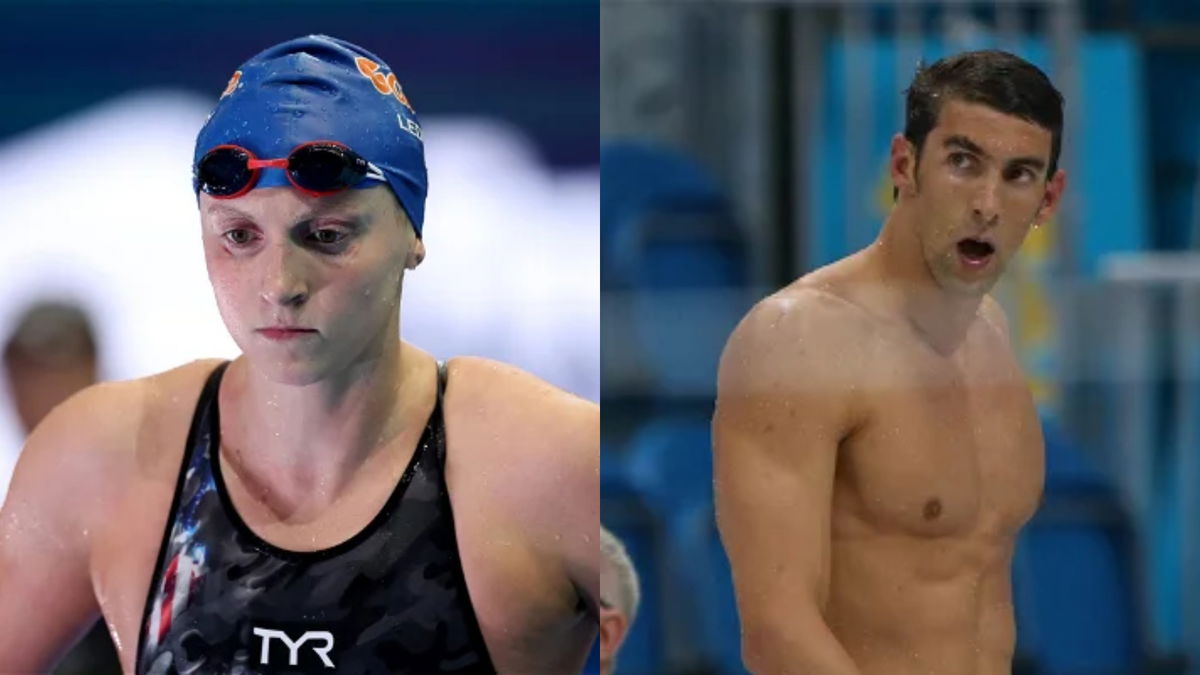

Katie Ledecky has always looked up to Michael Phelps as both a mentor and as a brotherly figure, but that doesn’t mean she agrees with him on everything! Phelps didn’t hold back when sharing his thoughts on the U.S. swimmers’ performances at the Paris Olympics, expressing disappointment. “For me as a whole I was pretty disappointed to see the U.S. swimming results,” he said, pointing out that the U.S. needs to adapt quickly to keep up with the rapidly evolving global swimming scene.
Watch What’s Trending Now!
“One of the things that I’ve always said for the last couple of years is that the rest of the world is catching up. I think, a lot of the things that we’ve done as a country for so long, the other people are catching up. They are doing the same thing. Hopefully, we’re able to make that transition leading into 2028,” shared the Baltimore Bullet.
But Katie Ledecky isn’t one to shy away from a challenge—and she’s got the perfect response. In a conversation with SWIMNERD, she confidently highlighted Team USA’s continued dominance. “Well, USA Swimming came out on top on the medal count once again. Both the gold and the total medal count were very happy with that outcome,” Ledecky noted.
ADVERTISEMENT
“But yeah, the rest of the world is getting faster, and it’s pushing all of us. And, you know, everyone is learning how to train in different ways and get faster. I think there’s more specificity in terms of events and what people are focusing on, so it just creates really good competition. And that’s what you want at the Olympics: you want to race the best of the best, you want to race the level of your competition, and that’s what we’re all doing.”
🇺🇸🦅🥇 pic.twitter.com/BtFy4qT1RR
— SWIMNERD (@SwimNerds) August 10, 2024
Team USA hit a rough patch early on, facing fierce competition from the young guns of Australia and Canada. The results weren’t exactly swimming in gold, and even legendary swimmer Michael Phelps was feeling the sting of disappointment. Caeleb Dressel, normally the king of the pool, struggled to defend his titles in the 100-meter butterfly and 50-meter freestyle, coming up empty-handed in those events.
ADVERTISEMENT
Katie Ledecky also had a hiccup, finishing third in the 400-meter freestyle behind Australia’s Ariarne Titmus and Canada’s Summer McIntosh. The U.S. women’s team missed out on gold in the 4×200-meter freestyle relay, settling for silver. The two countries, especially Australia are coming up as some of the toughest competitors of the USA. And that is not a mere coincidence. The two countries have built their capacity with carefully crafted strategies.
Despite being surrounded by water, Australia’s rise to becoming a swimming powerhouse is astonishing given its small population size. But they have a fail-safe strategy that never stops talents coming in.
ADVERTISEMENT
“Number one, with a population of 27 million, we have to be designed and very specific in our approach. Number two, we can’t get it wrong. Because we don’t have a lot to choose from, going up against the rest of the world, particularly America and China with a billion people. We can’t just waste our talent. So, we are always looking,” Rohan Taylor, head coach of the Australian national swimming team told to the Hindustan Times. Taylor had an important role to play in the rise of Australia after he took over in 2020.
Taylor brought back a system that gave Australia a lot of success in 1990s. Under this, the country has established eight high-performance centers, known as performance hubs: three in Queensland and one each in New South Wales, Melbourne, South Australia, Western Australia, and the Australian Institute of Sport. They have very close contact with the swimming clubs which is grassroots level.
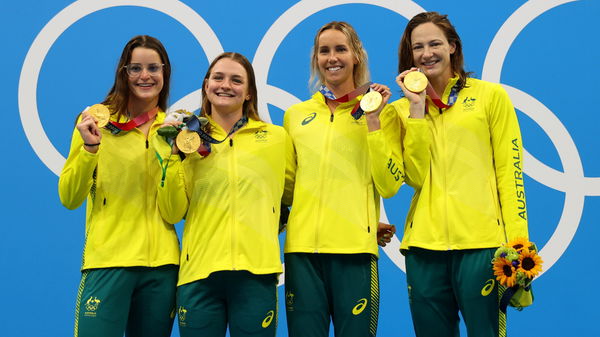
Reuters
Tokyo 2020 Olympics – Swimming – Women’s 4 x 100m Medley Relay – Medal Ceremony – Tokyo Aquatics Centre – Tokyo, Japan – August 1, 2021. Cate Campbell, Emma McKeon, Chelsea Hodges and Kaylee McKeown of Australia celebrate with their gold medals REUTERS/Marko Djurica
The swimmers start by swimming at the club level, followed by state championships and state talent identification leagues. The bussing talents from here are brought to the national event camps where stroke-specific youngsters are picked up. “We look for breaststrokers, backstrokers and then bring them in and hold purposeful stroke camps. The idea is to find talent early, get them into our system, educate them and their coaches,” Taylor explained.
ADVERTISEMENT
However, according to Taylor, this find does not only mean picking those who are making it to the podium in the state or national level competitions. But the watchful eyes also find those who have raw natural talent but need polishing. All these future swimmers are then brought together in national training camps.
“That’s where performance support will start capturing some footage, getting some data around them, do some test sets. That is then handed over to the coach; to take that data and go back to your home program and build on that. It therefore becomes a bit of a performance service center for them,” Taylor said. But how is this approach helping Australia?
ADVERTISEMENT
Because of their thorough mentoring and channelization of talent from an early age, the swimmers are deeply involved in their work by the time they reach the world stage. Because they might have already gone through multiple rounds of analysis and improvement os their swimming techniques, This is what is giving them the competitive edge, according to Taylor.
Australia’s performance in Tokyo gave a stamp on the success of the structure. They nabbed 22 medals including 9 golds. “In Tokyo, we had a group that was really hungry to perform. And we have the same group in Paris. It doesn’t guarantee the same medals, but what I do guarantee is that they’ll be in the hunt and in the fight,” Taylor had said when Australia had already secured two gold medals in Paris. And he was not wrong. This year also the Aussies pulled off dazzling performances picking up 18 medals including seven golds.
However, despite the debacle in the hands of Australia, Ledecky and Team USA found their groove and rallied back with a strong finish, dominating the charts!
ADVERTISEMENT
Team USA finally turned the tables at the Paris Olympics!
USA Swimming splashed to victory on the final night of pool action at the Paris 2024 Olympics, making quite the splash with two world records and a trove of medals. Bobby Finke turned the men’s 1500m freestyle into his personal playground, swimming away with gold and a new world record of 14:30.67. Hot on his heels, the men’s 4x100m medley relay team—Ryan Murphy, Nic Fink, Caeleb Dressel, and Hunter Armstrong—snagged silver. But the real showstopper was the women’s 4x100m medley relay squad—Regan Smith, Lilly King, Gretchen Walsh, and Torri Huske—who absolutely crushed it with a world record time of 3:49.63, finishing over three seconds ahead of the Aussies.
ADVERTISEMENT

USA Swimming topped the medal table with 28 total medals, outshining every other nation by ten. Katie Ledecky made history as the most decorated American female Olympian, while Torri Huske and Regan Smith were the top medalists for the Americans, each bagging five medals. Not to be outdone, the relay teams cleaned up, winning gold or silver in all seven relays, with two of those relays setting new world records.
ADVERTISEMENT
Reflecting on this dominance, Katie Ledecky’s message is clear: Team USA is still at the top, but the challenge from the rest of the world is only making them better. What are your thoughts on her passionate defense of Team USA swimming? Let us know in the comments below!
Top Stories
Sean Payton Announces Retirement Plans as Broncos HC Demands Improvement From Bo Nix & Co. Before Playoffs

Greg Biffle’s $4M Worth Prized Possession Still Without a Buyer Leaves NASCAR Fans Heartbroken

LIV Golf Braces for Another Possible Exit in Wake of Brooks Koepka Departure

Biff Poggi All But Confirms Bryce Underwood’s Michigan Future After Announcing His Own Departure
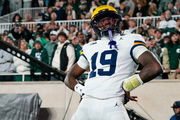
Roger Federer Draws Criticism from Swiss Government Chief for Tourism Boom in Country
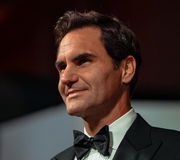
NASCAR World Mourns as Former Watkins Glen President Michael Printup Passes Away at 60
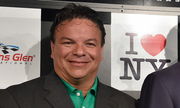
ADVERTISEMENT
ADVERTISEMENT
ADVERTISEMENT

